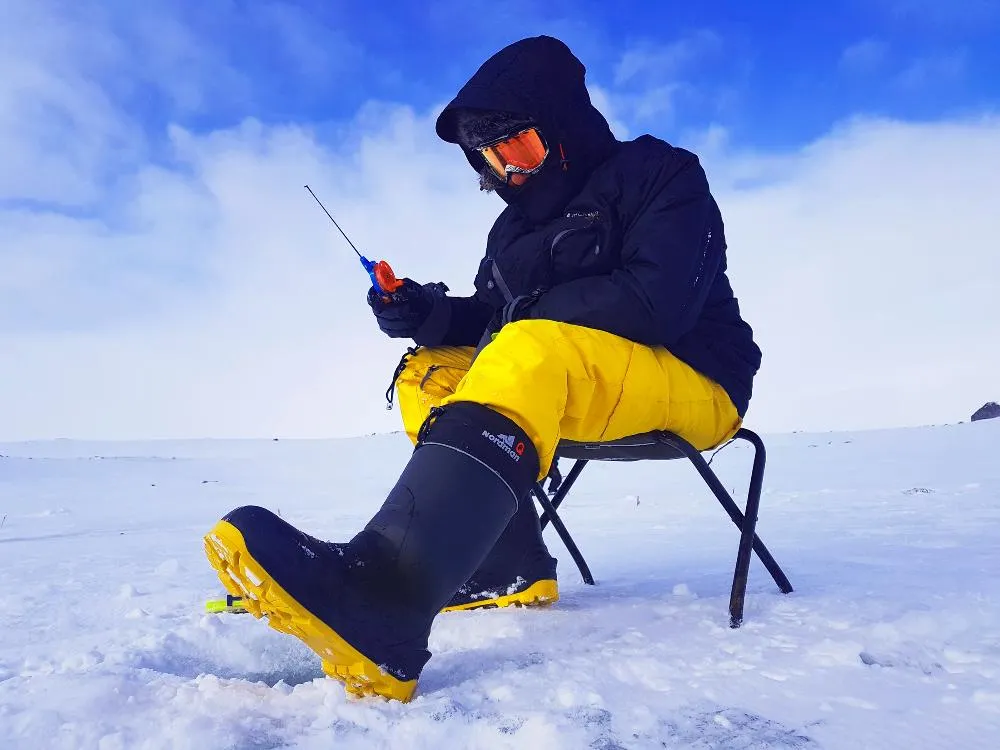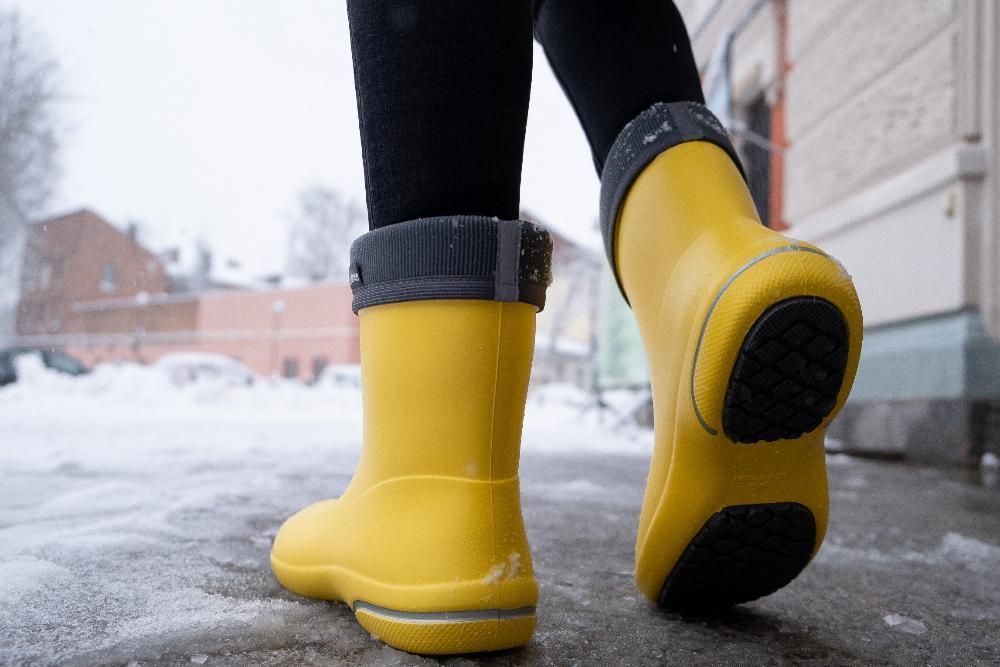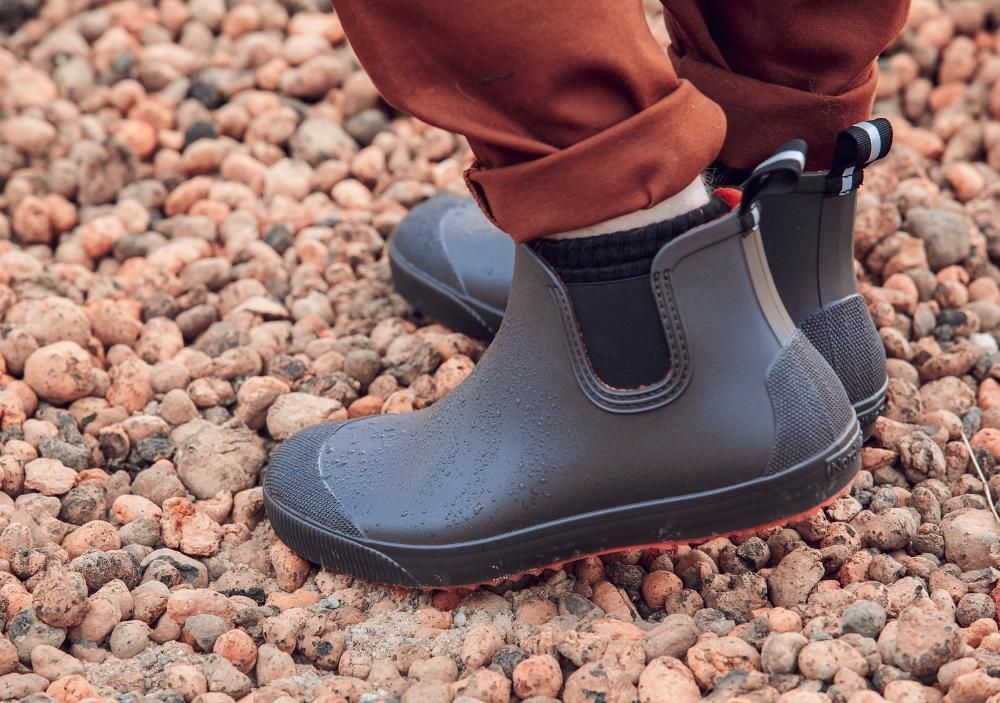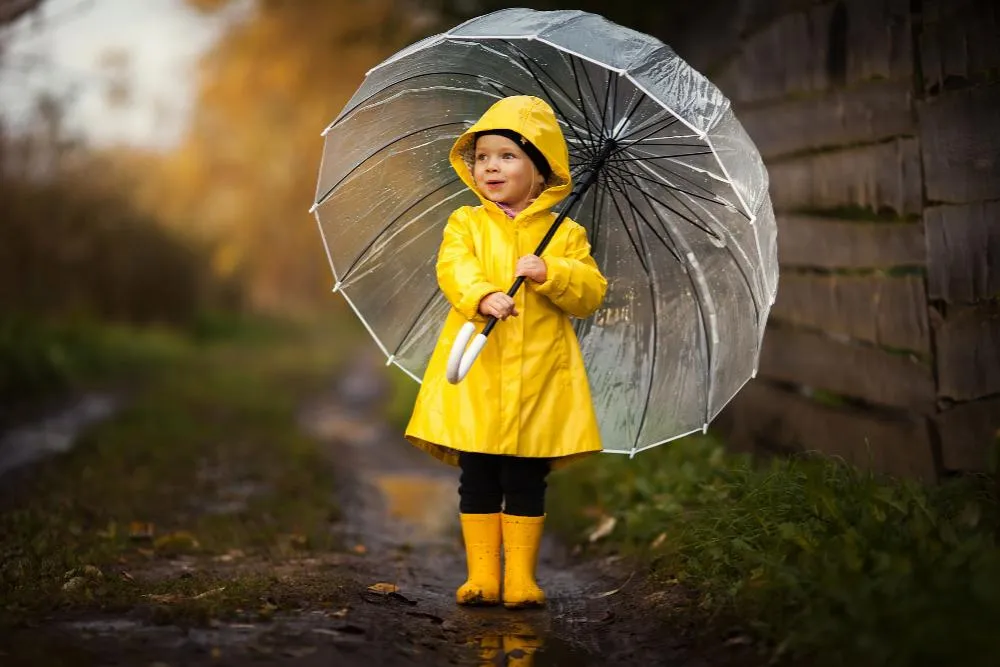
The Nordman factory develops online sales channels and relies on import substitution

Alexey Sorokin, marketing director of the Nordman factory, answers SR's questions. For 24 years of work, the team of a small manufacturing enterprise from Pskov has transformed into a large Russian enterprise and a team of specialists who are working on creating the best footwear for uncomfortable, extreme conditions. At the moment, the company has over 750 employees. Nordman today there are 3 completely different lines of footwear: everyday urban footwear for adults and children, footwear for hunting and fishing, specialized work footwear with protective elements. The factory sells footwear not only in Russia, but also exports its products to the Baltic States, Belarus, Ukraine, to more than 24 countries around the world.
 Alexey Sorokin - Marketing director of the Nordman factory.
Alexey Sorokin - Marketing director of the Nordman factory.SR: Alexey, how did Russian companies develop in the very difficult year of 2020?
Alexey Sorokin: 2020 really turned out to be a difficult year, planning it in 2019, we looked to the future with very cautious optimism. We planned to go through 2020 at the level of 2019, and this would be a satisfactory result for us. After the introduction of non-working days at the end of March, we did not stop production, but continued to work in a limited mode, in accordance with the decrees of local authorities. We were allowed to work as an enterprise producing work shoes, while at the same time we mastered the production of protective hygienic masks and medical suits in almost a week.
Due to the fact that, after all, the scale of our activities in the spring of 2020 was much smaller than usual, we started to optimize internal processes at the enterprise, mastered a new practice of online negotiations with customers and suppliers, even created our own Nordman academy for online training and webinars with partners. We also learned to work remotely, because some of the employees still had to be transferred to a remote mode of work. I'm not talking about the anti-epidemic sanitary measures at the enterprise, which we introduced immediately after the pandemic began, and we continue to follow the recommendations of Rospotrebnadzor to this day. Of course, demand dropped, partner stores where our shoes are sold were closed for almost 2 months, but some of them continued to trade, being included in the lists of organizations that were allowed to work during the pandemic. We had to revise plans and budgets for 2020, we carefully lowered them, somewhere even in vain, because the online demand for goods has only grown.
We were worried that non-working people would tighten their belts, but state support, and simply the need to buy shoes, either postponed demand or transferred it to the Internet. After almost all restrictions on the work of organizations were lifted, sales jumped sharply, and the time when many enterprises were not working or were working in a limited mode led to a partial shortage of various types of shoes.
SR: How the pandemic affected business proprocesses: production cycle, development of retail and customer services?
A.S .: As such, we do not note the impact of the pandemic on the internal processes of the factory. In 2020, we already planned to increase labor productivity by introducing modern technologies in the field of digitization of business and technical processes, in terms of managing stocks of raw materials and materials, introducing a new quality management system and EDI. This work is being carried out to this day, bringing positive results. For several years we have been actively developing our own online retail sales. We planned to grow in 2020, but we did not expect big growth starting from the second half of last year. In a timely manner, we made a number of decisions on the internal processes of the online store, increased advertising budgets, began to analyze the money spent on incoming traffic in a different way, made a number of improvements on the site in order to increase the average check and conversion in general. As a result, we ended the year 2020 in retail with a significant overfulfillment of plans and with an optimistic attitude towards the development of online channels in the future. Not without marketplaces, where we are present and quite successfully sell our shoes, especially for children. The plans also include the construction of offline retail and the development of wholesale online sales.
SR: How was the introduction of mandatory labeling, the pros and cons that have already been identified?
A.S .: In 2020, the new rules and conditions for shoe labeling came into force. It's no secret that we stood at the origins of the labeling and took part in a pilot project back in 2018. Then it seemed that we were ready for everything, learned everything and would meet the obligatory marking fully armed, but it only seemed to be. The implementation took place not without difficulties, especially the speed of the marking operator's reaction to the emerging questions about the shortcomings in the processes on their part. Each production is unique in its own way, and the rules were established by the state for all the same. And here we really had to work on some processes in production and in internal logistics, and some processes had to be reconfigured again. But we overcame all these temporary difficulties thanks to our belief in positive changes in the footwear market in Russia. After all, it is no secret that the entire civilized market of suppliers and manufacturers of footwear expects only one thing from labeling: putting things in order and “whitewashing” a significant part of the shadow sector. This will make it possible to compete in good faith on the market, which in itself will lead to the progress of organizations and enterprises and an improvement in the quality of products manufactured and imported into Russia. As a result, today we and our partners are selling labeled products throughout Russia. Of course, there are still some shortcomings in this system, but I am sure that in the near future all of them will be eliminated.
SR: Import substitution: how successful is it in the footwear sector?
A.S .: Of course, the Russian footwear industry is not ready to completely take over production within the country, there are many reasons for this: this is the insufficient capacity of Russian factories and factories where raw materials, materials and components for footwear are produced, this is also a lack of technologies and specialists in the footwear industry. But we managed, it seems to us, to partially replace some goods from Europe on the Russian market, I will not specify trademarks, however, based on the growth in sales of some of our products and on the partial or complete disappearance of some imported goods from the shelves, we can safely say: yes, we we managed to carry out import substitution, and we intend to continue to follow, including along this path.
SR: Your results for 2020 and plans / wishes for 2021 ...
A.S .: For us, 2020 ended with an unexpectedly good result (relative to expectations during the spring events of last year). We produced more shoes than planned, revenue grew by 15% compared to 2019, we did not reduce the number of jobs, and even increased in some areas, and we continue to recruit employees. We received tangible financial support from the state, which helped us not to stop developing. And in 2021, we plan to increase all key operating indicators, build new workshops, expand production capacity, create new jobs, as well as release new shoe models for the whole family. I want to wish everyone that nothing disrupts your plans and we finally come out of the pandemic with minimal losses and return to a normal lifestyle, normal work and business.
Materials prepared by Ekaterina Sergeeva
| Please rate the article |
Materials on the topic
What is the mistake of suppliers of children's shoes in working with wholesale companies

How to work with marketplaces to avoid competition between the online assortment and the offline store

Brazilian shoe manufacturers invite buyers from Russia and CIS countries to business meetings in online format
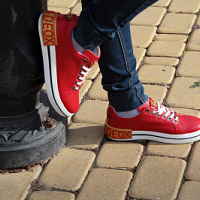
DEOX strengthens its market position
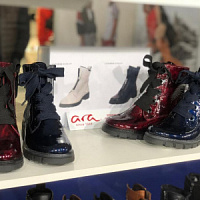
Lillian Roor, ARA Sales Director in Russia: “ARA Shoes strives to be the most high-tech manufacturer of fashionable footwear.
Popular
 Coach turned to Big Data analysis and won the interest of a young audience
American handbag brand Coach has planned the success of its Tabby model among a younger audience, Generation Z, by turning to big data analysis, abandoning traditional and analogue tools, such as human intuition or the ability of any executive to sense “which way the wind will blow,” writes B.O.F.
Coach turned to Big Data analysis and won the interest of a young audience
American handbag brand Coach has planned the success of its Tabby model among a younger audience, Generation Z, by turning to big data analysis, abandoning traditional and analogue tools, such as human intuition or the ability of any executive to sense “which way the wind will blow,” writes B.O.F.
 IDOL updates the concept
The IDOL brand, part of the Melon Fashion Group portfolio, opened the first flagship in an updated concept in the Aviapark shopping center in Moscow.
IDOL updates the concept
The IDOL brand, part of the Melon Fashion Group portfolio, opened the first flagship in an updated concept in the Aviapark shopping center in Moscow.
 Seven “sins” of the shoe business. How do owners harm the company with their own hands?
Why is Company X able to create a strong, profitable brand, but Company Y is struggling to make ends meet? Many people prefer to attribute success to luck, luck, or the support of strong patrons. And few people ask themselves the question: “What am I doing wrong?” Moreover, many entrepreneurs begin to harm their business from the first day of its opening. In this article, together with SR expert in the field of fashion business management and development, Maria Gerasimenko, we will look at the 7 main “sins” that business owners commit using specific examples.
Seven “sins” of the shoe business. How do owners harm the company with their own hands?
Why is Company X able to create a strong, profitable brand, but Company Y is struggling to make ends meet? Many people prefer to attribute success to luck, luck, or the support of strong patrons. And few people ask themselves the question: “What am I doing wrong?” Moreover, many entrepreneurs begin to harm their business from the first day of its opening. In this article, together with SR expert in the field of fashion business management and development, Maria Gerasimenko, we will look at the 7 main “sins” that business owners commit using specific examples.
 Louis Vuitton opens a new factory in Italy
Louis Vuitton has opened its second shoe factory in Italy. After opening the first one in Fiesso d'Artico in Veneto, the LVMH flagship brand has just opened a new production site dedicated to this category of footwear in the industrial zone of Civitano in the Marche region. There is also another brand production facility in Tuscany, where bags and leather accessories are produced, writes fr.fashionnetwork.com.
Louis Vuitton opens a new factory in Italy
Louis Vuitton has opened its second shoe factory in Italy. After opening the first one in Fiesso d'Artico in Veneto, the LVMH flagship brand has just opened a new production site dedicated to this category of footwear in the industrial zone of Civitano in the Marche region. There is also another brand production facility in Tuscany, where bags and leather accessories are produced, writes fr.fashionnetwork.com.
 The Euro Shoes@CAF exhibition will be held in Almaty
From March 11 to 13, the Euro Shoes@CAF (Central Asia Fashion) exhibition will be held in Almaty at the Atakent exhibition complex. The exhibition, which is the largest international event in the fashion industry in Central Asia, will present collections of clothing, shoes and accessories.
The Euro Shoes@CAF exhibition will be held in Almaty
From March 11 to 13, the Euro Shoes@CAF (Central Asia Fashion) exhibition will be held in Almaty at the Atakent exhibition complex. The exhibition, which is the largest international event in the fashion industry in Central Asia, will present collections of clothing, shoes and accessories.
 Euro Shoes will start operating on February 19 in Moscow!
The winter session of the international exhibition of footwear and accessories Euro Shoes premiere collection will be held in Moscow at the Expocenter from February 19 to 22. The organizers promise the presence of all the main participants at the exhibition, as well as new names from Europe, Asia and Russia.
Euro Shoes will start operating on February 19 in Moscow!
The winter session of the international exhibition of footwear and accessories Euro Shoes premiere collection will be held in Moscow at the Expocenter from February 19 to 22. The organizers promise the presence of all the main participants at the exhibition, as well as new names from Europe, Asia and Russia.
 American buyers couldn't buy Birkin bags and sued Hermès
French fashion house Hermès is facing a lawsuit in California from two customers who were unable to purchase exclusive Birkin bags. The fashion house is accused of unfair commercial practices.
American buyers couldn't buy Birkin bags and sued Hermès
French fashion house Hermès is facing a lawsuit in California from two customers who were unable to purchase exclusive Birkin bags. The fashion house is accused of unfair commercial practices.
 Why Rendez-Vous and Yandex Lavka released a “bread bag”
Shoe retailer Rendez-Vous announced the launch of a spring collaboration with Yandex Lavka and released a roll that resembles the shape of a woman’s handbag. This “Bread Bag” is presented in the Yandex.Lavka application at a price of 249 rubles. On the product packaging there is a promotional code for 1000 rubles, which can be spent in the Rendez-Vous network.
Why Rendez-Vous and Yandex Lavka released a “bread bag”
Shoe retailer Rendez-Vous announced the launch of a spring collaboration with Yandex Lavka and released a roll that resembles the shape of a woman’s handbag. This “Bread Bag” is presented in the Yandex.Lavka application at a price of 249 rubles. On the product packaging there is a promotional code for 1000 rubles, which can be spent in the Rendez-Vous network.
 Camper has released innovative sneakers - designers
Spanish brand Camper's new Roku sneaker features six interchangeable components to create up to 64 different looks and color combinations. Roku means "six" in Japanese.
Camper has released innovative sneakers - designers
Spanish brand Camper's new Roku sneaker features six interchangeable components to create up to 64 different looks and color combinations. Roku means "six" in Japanese.
 Christian Louboutin presented a collection in a cowboy style
At the Loubi Show in Paris, the French luxury brand Christian Louboutin presented its fall 2024 collection, following the trend - in the style of the Wild West. It included cowboy boots and rhinestone loafers.
Christian Louboutin presented a collection in a cowboy style
At the Loubi Show in Paris, the French luxury brand Christian Louboutin presented its fall 2024 collection, following the trend - in the style of the Wild West. It included cowboy boots and rhinestone loafers.
 Fashion Week takes place in Moscow
Fashion Week takes place in the Russian capital. Events include fashion shows, markets where you can purchase clothes, bags and accessories, and a B2B Showroom for fashion industry professionals.
Fashion Week takes place in Moscow
Fashion Week takes place in the Russian capital. Events include fashion shows, markets where you can purchase clothes, bags and accessories, and a B2B Showroom for fashion industry professionals.
 Turkish brand Vaneda on Euro Shoes
Street style, sport, outdoor, military – the main style directions of footwear of the company from Turkey
Turkish brand Vaneda on Euro Shoes
Street style, sport, outdoor, military – the main style directions of footwear of the company from Turkey
 Kari accuses Zenden of unfair competition and is suing the FAS
The largest Russian shoe chain, Kari, appealed to the Moscow Arbitration Court to declare the actions of the Federal Antimonopoly Service (FAS) illegal, writes RBC.
Kari accuses Zenden of unfair competition and is suing the FAS
The largest Russian shoe chain, Kari, appealed to the Moscow Arbitration Court to declare the actions of the Federal Antimonopoly Service (FAS) illegal, writes RBC.
 Fashion trends Fall-Winter 2023/24 for commercial footwear purchases
Permanent contributor to Shoes Report. Elena Vinogradova, an expert in sales and purchases in the fashion business, prepared an overview of the trends for the autumn-winter 2023/24 season especially for us.
Fashion trends Fall-Winter 2023/24 for commercial footwear purchases
Permanent contributor to Shoes Report. Elena Vinogradova, an expert in sales and purchases in the fashion business, prepared an overview of the trends for the autumn-winter 2023/24 season especially for us.
 MSCHF and Crocs launch "Big Yellow Boots"
Creator of the Big Red Boots, Brooklyn brand MSCHF has teamed up with American plastic clog and sandal brand Crocs for another oversized shoe. The new Big Yellow Boots will go on sale on August 9th.
MSCHF and Crocs launch "Big Yellow Boots"
Creator of the Big Red Boots, Brooklyn brand MSCHF has teamed up with American plastic clog and sandal brand Crocs for another oversized shoe. The new Big Yellow Boots will go on sale on August 9th.
 Five rules of professional lighting for a shoe store - something that is relevant in any season
When developing a lighting concept for shoe retailers, it is important to take into account not only the history of the brand, the architectural content of the premises, the target audience of the stores, but also the seasonality of the goods. With the onset of the cold season, client preferences change: bright weightless shoes are replaced by more massive models in discreet dark colors. Despite significant differences in summer and winter collections, the overall philosophy of the brand, its recognition should remain unchanged at any time of the year. Tatyana Ryzhova, an SR lighting expert in fashion retail, has identified five basic rules for a competent lighting concept for a shoe store for readers of the magazine, which will help to present winter assortment to customers in a winning way.
Five rules of professional lighting for a shoe store - something that is relevant in any season
When developing a lighting concept for shoe retailers, it is important to take into account not only the history of the brand, the architectural content of the premises, the target audience of the stores, but also the seasonality of the goods. With the onset of the cold season, client preferences change: bright weightless shoes are replaced by more massive models in discreet dark colors. Despite significant differences in summer and winter collections, the overall philosophy of the brand, its recognition should remain unchanged at any time of the year. Tatyana Ryzhova, an SR lighting expert in fashion retail, has identified five basic rules for a competent lighting concept for a shoe store for readers of the magazine, which will help to present winter assortment to customers in a winning way.
 I doubt and object: how to find an approach to difficult clients?
How good and serene would be the work of a salesperson if the customers were calm, cheerful, always knew exactly what they wanted, and bought, bought, bought! It is a pity that this is possible only in dreams. Therefore, we will not dream, but we will act. Together with Maria Gerasimenko, a permanent author of SR, we understand the doubts and objections of buyers and build a strategy for working with them. Our expert pays special attention to the two main objections of buyers, on which 82% of sales are lost.
I doubt and object: how to find an approach to difficult clients?
How good and serene would be the work of a salesperson if the customers were calm, cheerful, always knew exactly what they wanted, and bought, bought, bought! It is a pity that this is possible only in dreams. Therefore, we will not dream, but we will act. Together with Maria Gerasimenko, a permanent author of SR, we understand the doubts and objections of buyers and build a strategy for working with them. Our expert pays special attention to the two main objections of buyers, on which 82% of sales are lost.
 EURO SHOES presents an updated section of the GLOBAL SHOES exhibition with collections of shoe and bag brands from Asian countries
EURO SHOES premiere collection is expanding. Along with the traditional pool of leading European footwear brands from Germany, Spain, Italy and Turkey, several dozen footwear and bag brands from the Middle Kingdom will be presented in the GLOBAL SHOES section at the Moscow Expocentre from August 29 to September 1.
EURO SHOES presents an updated section of the GLOBAL SHOES exhibition with collections of shoe and bag brands from Asian countries
EURO SHOES premiere collection is expanding. Along with the traditional pool of leading European footwear brands from Germany, Spain, Italy and Turkey, several dozen footwear and bag brands from the Middle Kingdom will be presented in the GLOBAL SHOES section at the Moscow Expocentre from August 29 to September 1.
 World Footwear Yearbook: Global footwear production reaches 23,9 billion pairs and is back to pre-pandemic levels
The Portuguese association of shoe manufacturers APICCAPS published the 13th edition of the international statistical bulletin World Footwear Yearbook for 2023, according to which in 2022 the production and export of shoes worldwide increased by 7,6% and 9%, respectively, and the world production of shoes reached 23,9 billion couples and returned to pre-pandemic levels.
World Footwear Yearbook: Global footwear production reaches 23,9 billion pairs and is back to pre-pandemic levels
The Portuguese association of shoe manufacturers APICCAPS published the 13th edition of the international statistical bulletin World Footwear Yearbook for 2023, according to which in 2022 the production and export of shoes worldwide increased by 7,6% and 9%, respectively, and the world production of shoes reached 23,9 billion couples and returned to pre-pandemic levels.
 Rostov footwear brand Novak presented a collection of sneakers and sneakers
In the spring-summer 2023 season, the Rostov-on-Don shoe brand Novak presented a cute collection of sneakers and sneakers for every day. The upper of the shoe is made of genuine leather, suede, nubuck, the sole is made of light EVA.
Rostov footwear brand Novak presented a collection of sneakers and sneakers
In the spring-summer 2023 season, the Rostov-on-Don shoe brand Novak presented a cute collection of sneakers and sneakers for every day. The upper of the shoe is made of genuine leather, suede, nubuck, the sole is made of light EVA.
 Jacquemus x Nike collaboration released
The second collaboration between Jacquemus and Nike, which has been talked about so much, is finally out. The appearance of the couple for many was a surprise. The model of Nike Air Force 1 sneakers, which was taken as the basis of the new collection, has undergone significant changes.
Jacquemus x Nike collaboration released
The second collaboration between Jacquemus and Nike, which has been talked about so much, is finally out. The appearance of the couple for many was a surprise. The model of Nike Air Force 1 sneakers, which was taken as the basis of the new collection, has undergone significant changes.
 Crocs releases a collaboration with Barbie
If Barbie ditched heels and wore crocs, they would be pink. It was this collection in pink that was released by the American brand of plastic clogs Crocs, for the release of the film "Barbie" in the United States.
Crocs releases a collaboration with Barbie
If Barbie ditched heels and wore crocs, they would be pink. It was this collection in pink that was released by the American brand of plastic clogs Crocs, for the release of the film "Barbie" in the United States.
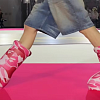 Japanese BAPE takes to the catwalk MSCHF Big Red Boots
The story of Brooklyn brand MSCHF's oversized rubber boots continues. The last time they made noise in the auditorium was at the Rick Owens menswear show. Now they have already appeared on the podium.
Japanese BAPE takes to the catwalk MSCHF Big Red Boots
The story of Brooklyn brand MSCHF's oversized rubber boots continues. The last time they made noise in the auditorium was at the Rick Owens menswear show. Now they have already appeared on the podium.
 Shoe educational program: what shoe soles are made of
“What is the difference between TEP and EVA? What does tunit promise me? Is PVC glue? What is the sole of these shoes made of? ”- the modern buyer wants to know everything. In order not to smash his face in front of him and be able to explain whether such a sole suits him in soles, carefully read this article. In it, process engineer Igor Okorokov tells what materials the soles of shoes are made of and what makes each of them so good.
Shoe educational program: what shoe soles are made of
“What is the difference between TEP and EVA? What does tunit promise me? Is PVC glue? What is the sole of these shoes made of? ”- the modern buyer wants to know everything. In order not to smash his face in front of him and be able to explain whether such a sole suits him in soles, carefully read this article. In it, process engineer Igor Okorokov tells what materials the soles of shoes are made of and what makes each of them so good.
 How to set prices that will earn
Some businessmen still confuse the concept of margin with the concept of trade margins and set prices for their goods, guided solely by the example of competitors. No wonder they go broke! Analyst at the Academy of Retail Technologies Maxim Gorshkov gives several tips and formulas with which you can set not only ruinous, but also profitable prices.
How to set prices that will earn
Some businessmen still confuse the concept of margin with the concept of trade margins and set prices for their goods, guided solely by the example of competitors. No wonder they go broke! Analyst at the Academy of Retail Technologies Maxim Gorshkov gives several tips and formulas with which you can set not only ruinous, but also profitable prices.
 Sales of shoes and accessories: effective techniques for business rhetoric
Which speech modules are effective in communicating with potential and current customers of shoe stores, and which are not, Anna Bocharova, a business consultant, knows.
Sales of shoes and accessories: effective techniques for business rhetoric
Which speech modules are effective in communicating with potential and current customers of shoe stores, and which are not, Anna Bocharova, a business consultant, knows.
 We form the salary of sellers: expert advice
“How do you charge your consultants for personal or general sales?” Is one of the most popular questions causing a lot of controversy and gossip on the online forums of retail business owners. Indeed, how to properly form the earnings of sellers? But what about bonuses, where to get a sales plan from, do employees allow them to buy goods at discounted stores? In search of truth, the Shoes Report turned to a dozen shoe retailers, but no company wanted to disclose its motivation system - the process of its development was too complicated and individual. Then we asked four business consultants, and finally became convinced that the topic of seller motivation is very complex, because even our experts could not come to a common opinion.
We form the salary of sellers: expert advice
“How do you charge your consultants for personal or general sales?” Is one of the most popular questions causing a lot of controversy and gossip on the online forums of retail business owners. Indeed, how to properly form the earnings of sellers? But what about bonuses, where to get a sales plan from, do employees allow them to buy goods at discounted stores? In search of truth, the Shoes Report turned to a dozen shoe retailers, but no company wanted to disclose its motivation system - the process of its development was too complicated and individual. Then we asked four business consultants, and finally became convinced that the topic of seller motivation is very complex, because even our experts could not come to a common opinion.
 Technology Selling Issues
There is nothing worse than meeting the buyer with the words “Hello, can I help you with something?”, Because the seller works in the store just to help. Criticizing this well-established pattern of communication with the buyer, Andrei Chirkarev, business coach for effective sales and the founder of the New Economy project, shares the technology of truly selling issues with readers of Shoes Report.
Technology Selling Issues
There is nothing worse than meeting the buyer with the words “Hello, can I help you with something?”, Because the seller works in the store just to help. Criticizing this well-established pattern of communication with the buyer, Andrei Chirkarev, business coach for effective sales and the founder of the New Economy project, shares the technology of truly selling issues with readers of Shoes Report.
 The whole truth about Bayer. Who is he and how to become one?
Bayer is no longer a new, but still a popular and sought-after profession. It’s fashionable to be a buyer. Buyers are at the origins of the emergence and development of trends. If the designer offers his vision of fashion in the season, then the buyer selects the most interesting commercial ideas. It is on buyers that the policy of sales of stores and what, in the end, the buyer will wear depends on. This profession is surrounded by a magical fleur, often associated with a lack of understanding of what exactly is the work of a buyer.
The whole truth about Bayer. Who is he and how to become one?
Bayer is no longer a new, but still a popular and sought-after profession. It’s fashionable to be a buyer. Buyers are at the origins of the emergence and development of trends. If the designer offers his vision of fashion in the season, then the buyer selects the most interesting commercial ideas. It is on buyers that the policy of sales of stores and what, in the end, the buyer will wear depends on. This profession is surrounded by a magical fleur, often associated with a lack of understanding of what exactly is the work of a buyer.
 Fur, and not only: types of lining
In the production of winter footwear, various materials are used that are designed to retain heat and meet the requirements of consumers: natural sheepleather, artificial fur, artificial fur from natural wool and others. All types of lining fur have their own advantages and disadvantages. Let's consider the properties of each of them.
Fur, and not only: types of lining
In the production of winter footwear, various materials are used that are designed to retain heat and meet the requirements of consumers: natural sheepleather, artificial fur, artificial fur from natural wool and others. All types of lining fur have their own advantages and disadvantages. Let's consider the properties of each of them.
 Retail Arithmetic
Before you begin to solve specific problems, you need to find out how accurately all the leaders of your company understand the basic terminology of retail.
Retail Arithmetic
Before you begin to solve specific problems, you need to find out how accurately all the leaders of your company understand the basic terminology of retail.
 How to fire a worker without tears, scandal and trial
Sooner or later, any manager is faced with the need to part with an employee. Properly and on time the dismissal procedure will save the company money, and the boss himself - nerves and time. But why sometimes, knowing that a break in relations is inevitable, we put off the decision for months?
How to fire a worker without tears, scandal and trial
Sooner or later, any manager is faced with the need to part with an employee. Properly and on time the dismissal procedure will save the company money, and the boss himself - nerves and time. But why sometimes, knowing that a break in relations is inevitable, we put off the decision for months?


